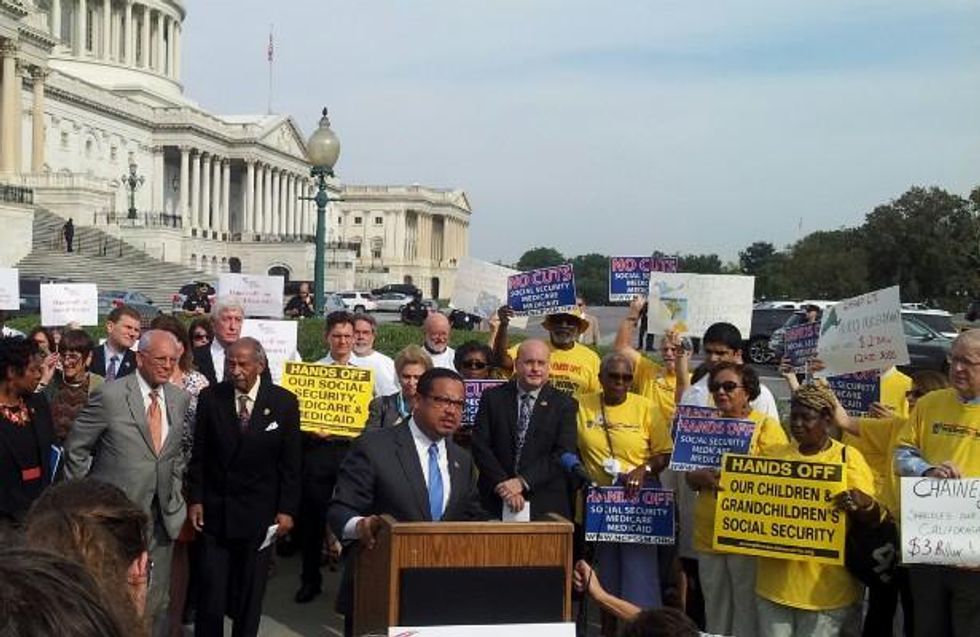Amid an ongoing shutdown of the federal government, members of the Congressional Progressive Caucus held a news conference and after joined hands with members of the Alliance for Retired Americans, Social Security Works and the National Committee to Preserve Social Security and Medicare in order to protest the idea of a "Grand Bargain" between Democrats and Republicans that has been repeatedly floated over a series of budget battles in recent years.
"Folks are scurrying around here, trying to figure out how to end the shutdown. And sometimes I've heard [Democrats] say 'You know, maybe we should give them something.'" said Representative Keith Ellison, co-chair of the Congressional Progressive Caucus. "Some folks say 'We'll give you Chained CPI.'"
"No way! No way!" Ellison then shouted. "Open up the government. Put a clean CR on. Stop this austerity... The way we hang together here is we make sure nobody, but nobody, gets sold out in exchange for Republicans doing their job, which is funding the government."
A Human Chain Against the Chained CPIhttps://ourfuture.org joins activists at the U.S. Capitol protesting proposed cuts in Social Security benefits known as the "chained ...
As Emily Foster, a fellow at the Campaign for America's Future's, explains, "The CPI, or consumer price index, is a calculation of how prices change over time. It is used to make cost-of-living adjustments in programs like veterans' benefits, food stamps, and Social Security. The premise behind the 'chained CPI' is that when prices rise, people settle for cheaper substitutes. Because of this, cost-of-living adjustments under the chained CPI would be lower than the actual standard of living, cutting benefits for citizens who need them the most"
Pitched to the American people as an "adjustment" of the program, however, economists and experts call it for what it is: a cut to benefits.
"Chained CPI is a benefit cut, plain and simple," said Rep. Barbara Lee (D-Calif) to reporters. Citing established figures, Foster contends that implementing the change "would cut benefits by at least $135 billion over 10 years."
And as The Nation's George Zornick reports:
We've seen this movie before: Republicans force a showdown in Congress over funding the government, the debt ceiling or, in the present case, both. Then a "grand bargain" is proposed to solve the impasse--one that includes serious reductions to social insurance programs.
That's just how the GOP would like the current drama to play out. Wednesday, National Review's Robert Costa reported that House Speaker John Boehner and Representative Paul Ryan are rallying nervous Republicans by telling them that while Obamacare may not end up getting defunded, GOP leadership is cooking up another big budget deal that includes cuts to the safety net so cherished by many conservative members. "It's the return of the grand bargain," one member told Costa. "Ryan is selling this to everybody; he's getting back to his sweet spot," said another.
In particular, Costa mentioned Chained CPI as one component of the emerging proposal. This, you may recall, is a cut to Social Security benefits dressed up as a ostensibly "more accurate" recalibration of the formula used to adjust benefits to inflation. (It's not.)
And Foster's colleague at CAF, Richard Eskow, offered 8 reasons why the Democrats should not enter into any so-called 'Grand Bargain' with Republicans over the shutdown, and concluded:
The shutdown was a disastrous move [by the the Republican Party], and nothing we've said should be misinterpreted as suggested that it's acceptable. It must end, and as soon as possible. But the solution isn't to replace one disaster with another by sacrificing the financial security of American seniors.

